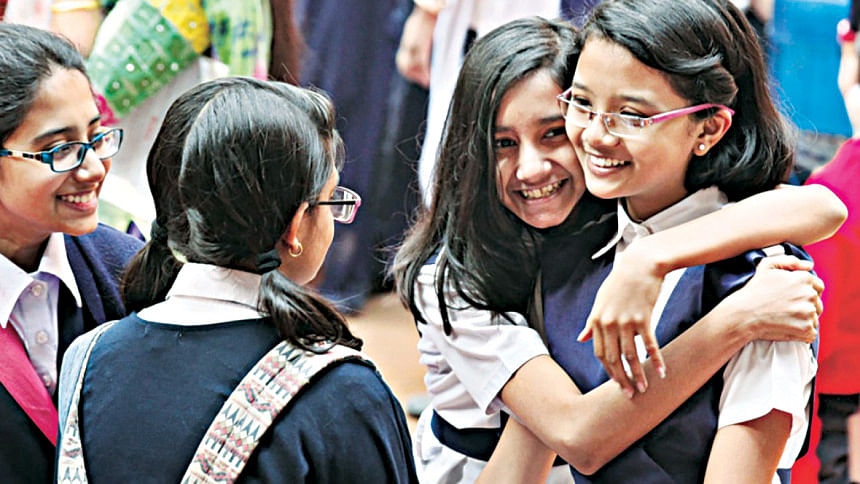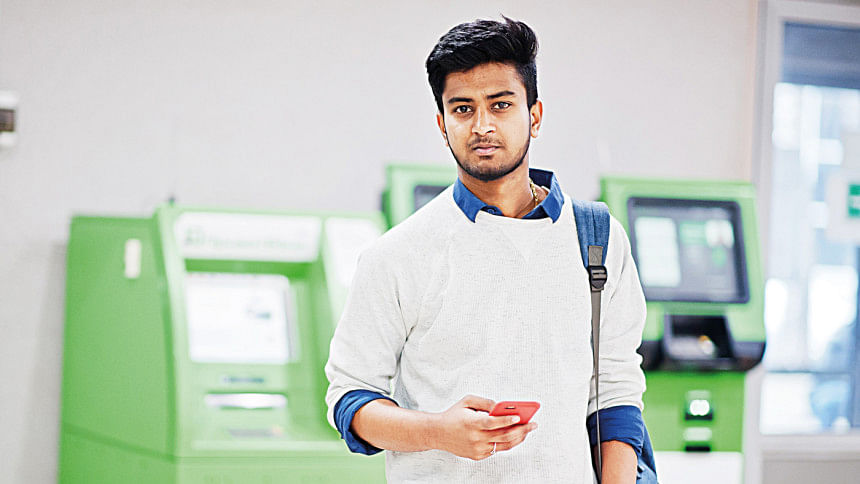Shaping a saving generation

Youth represent one of the most vital and dynamic segments of Bangladesh's population, with over 45% under the age of 25. Recognising the transformative potential of this demographic, Bangladesh has prioritised youth financial inclusion, embedding it into the broader development agenda. At the heart of this effort is Bangladesh Bank's School and Youth Banking initiative—a visionary programme designed to instil financial literacy, promote savings habits, and foster responsible engagement with the formal financial system from an early age.
Launched in November 2010 and formalised through a comprehensive policy in 2013, the School Banking programme offers students under 18 access to modern banking services. Through School Banking Accounts (SBAs), students learn to engage with essential financial tools, including digital platforms. These accounts seamlessly transition into standard savings accounts once students turn 18, ensuring long-term financial engagement and trust in the banking system.
As of February 2025, nearly five million active school banking accounts have been opened, with private commercial banks facilitating over 70% of them. Notably, girls now hold 48.94% of these accounts, reflecting significant progress toward gender-inclusive financial access. Once dominated by urban participation, the programme now sees rural students comprising 53% of account holders, thanks to increased outreach and mobile banking innovations. However, disparities remain—urban students still account for 71% of total deposits, compared to just 29% from rural areas—highlighting the need for deeper financial empowerment in underserved communities.
Although deposit volumes have declined slightly since September 2023, likely due to inflationary pressure on lower and middle-income families, the continued increase in account numbers signals growing financial awareness and trust among the youth.
Bangladesh Bank's efforts have not gone unnoticed. In 2024, it received the prestigious Global Youth Financial Inclusion Award from the Alliance for Financial Inclusion. Its core strategies include integrating financial literacy into the national curriculum, launching a dedicated website for literacy, and issuing youth banking guidelines. In March 2025, the central bank mandated that all scheduled banks conduct school banking through their nearest branches—ensuring accessibility and deepening community engagement.

A defining feature of the programme is its inclusivity. Student-friendly policies, such as low or no minimum balance requirements and waived service charges, make banking accessible even for students from low-income families. In rural areas, these accounts often serve as the first point of contact with formal financial systems, helping to bridge the urban-rural financial divide.
This success is amplified through active parental engagement and the support of educational institutions. Since 2014, School Banking Conferences have served as critical platforms for promoting financial literacy at the grassroots. These community events bring together students, teachers, parents, and local officials through workshops, speeches, and interactive sessions.
Challenges persist. Urban students enjoy better banking infrastructure and educational resources, often resulting in higher savings rates and more active use. Overcoming these gaps requires sustained outreach, improved infrastructure, and awareness campaigns tailored to underserved communities.
Looking ahead, schools and banks are encouraged to adopt automated financial systems and fully integrate financial education into the curriculum. Normalising banking in students' daily lives will reinforce positive financial behaviour and prepare them for financially responsible adulthood.
School and youth banking in Bangladesh is more than a financial service—it is a transformative tool for empowerment and national development. By promoting savings, fostering financial literacy, and ensuring inclusive banking access, these initiatives are shaping a generation of informed citizens ready to lead Bangladesh into a more equitable and prosperous future.
The momentum behind youth financial inclusion extends beyond school-based programmes.
Leading commercial banks have taken significant steps to broaden youth banking, designing products for students, freelancers, early professionals, and part-time workers—across both urban and rural areas. These efforts reflect growing recognition that youth financial empowerment is central to long-term economic development. Eastern Bank PLC (EBL) is a pioneer in this space. According to Md. Raquib, Acting Head of Bancassurance & Student Banking:
"EBL offers the Junior Savings Account for those under 18 and the Campus Account for students aged 18–28. These accounts include benefits such as dual currency cards and free insurance (BDT 5,000/month in case of death or disability). We run extensive school and college roadshows and offer three tailored DPS products: EBL Little Star, Child Future Plan, and Aspire Scheme, designed to help families save for education, healthcare, and other goals."
In 2025 alone, EBL conducted 132 roadshows and opened over 54,000 youth accounts—almost evenly split between urban and rural participants—showcasing the bank's expanding footprint. Engagement tools such as schoolbags, T-shirts, and agent banking also help deepen reach.
Al-Arafah Islami Bank PLC shares a similar commitment. Mohammad Rafiqul Islam, EVP & Head of Retail Banking, said:
"Our youth portfolio extends beyond students to include young professionals and freelancers. We offer minor accounts managed by guardians, zero SMS and maintenance fees, and exclusive merchant discounts. It's about helping youth develop sustainable financial habits."

Their "One School, One Branch, One Bank" model ensures every branch partners with a school annually—hosting seminars, opening accounts, and collecting tuition through bank booths. CSR initiatives also include distributing educational materials, reinforcing community roots.
City Bank brings innovation with products like the School Plan and College Plan. Md. Arup Haider, Deputy Managing Director & Head of Retail Banking, explained:
"The School Plan offers zero-maintenance accounts with daily interest and free passport endorsements. The College Plan extends benefits with debit cards and mobile banking through Citytouch. We've opened over 1,500 accounts in top universities like NSU and AIUB through campus drives."
The bank also co-organises the Annual School Banking Conference with Bangladesh Bank, demonstrating long-term investment in youth empowerment.
Midland Bank adopts a dual-tier approach through the MDB School Savers Account and MDB College Savers Package. Md. Rashed Akter, Head of Retail Distribution & Chief Bancassurance Officer, noted:
"We encourage saving through competitive interest rates, zero maintenance fees, and flexible DPS plans starting from just BDT 250. In 2024, we launched a Financial Literacy Wing to conduct awareness sessions in schools and colleges on budgeting, saving, and personal finance."
Midland also prioritises outreach to girls and rural youth via events and agent banking.
Bank Asia PLC promotes financial literacy through its Smart Junior Saver Account. Md. Shami Noor Rahman, Senior Executive Vice President, explained:
"This account is for individuals under 18 and is operated by a guardian. Minors aged 12 and above can be joint signatories. It offers a higher ISR than regular savings accounts, daily profit calculation, and ATM access with parental consent. Free internet banking and scholarships are also available. On reaching 18, it converts to a Mudaraba Savings Account."
From central policy to grassroots efforts, Bangladesh's youth banking landscape is evolving into a powerful framework for inclusive growth. Whether through Bangladesh Bank's visionary programmes or commercial banks' tailored strategies, the goal is clear: equip the next generation with the tools, confidence, and knowledge to manage money wisely.
By embedding financial literacy into early education and ensuring accessible banking for all youth—urban or rural, student or freelancer—Bangladesh is laying the foundation for a more financially secure and resilient future. An empowered youth means a stronger nation.

 For all latest news, follow The Daily Star's Google News channel.
For all latest news, follow The Daily Star's Google News channel. 



Comments